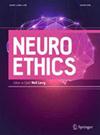反对类有机体意识的理由
IF 3.8
4区 哲学
Q1 ETHICS
引用次数: 0
摘要
神经有机体是实验室生成的实体,可复制人脑的某些结构和功能特征。大多数神经器官都是非实体的--与感觉输入和运动输出完全分离。因此,有关其潜在意识能力的问题异常难以回答。本文并不否认需要谨慎对待某些神经器官类型,但它呼吁对任何适当的意识理论进行两个广泛的限制--第一个限制涉及意识对体现的依赖;第二个限制涉及意识对表象的依赖--来论证非实体神经器官不是意识的可信候选者。本文章由计算机程序翻译,如有差异,请以英文原文为准。
The Case Against Organoid Consciousness
Neural organoids are laboratory-generated entities that replicate certain structural and functional features of the human brain. Most neural organoids are disembodied—completely decoupled from sensory input and motor output. As such, questions about their potential capacity for consciousness are exceptionally difficult to answer. While not disputing the need for caution regarding certain neural organoid types, this paper appeals to two broad constraints on any adequate theory of consciousness—the first involving the dependence of consciousness on embodiment; the second involving the dependence of consciousness on representations—to argue that disembodied neural organoids are not plausible candidates for consciousness.
求助全文
通过发布文献求助,成功后即可免费获取论文全文。
去求助
来源期刊

Neuroethics
MEDICAL ETHICS-
CiteScore
5.50
自引率
7.10%
发文量
31
审稿时长
>12 weeks
期刊介绍:
Neuroethics is an international, peer-reviewed journal dedicated to academic articles on the ethical, legal, political, social and philosophical questions provoked by research in the contemporary sciences of the mind and brain; especially, but not only, neuroscience, psychiatry and psychology. The journal publishes articles on questions raised by the sciences of the brain and mind, and on the ways in which the sciences of the brain and mind illuminate longstanding debates in ethics and philosophy.
 求助内容:
求助内容: 应助结果提醒方式:
应助结果提醒方式:


